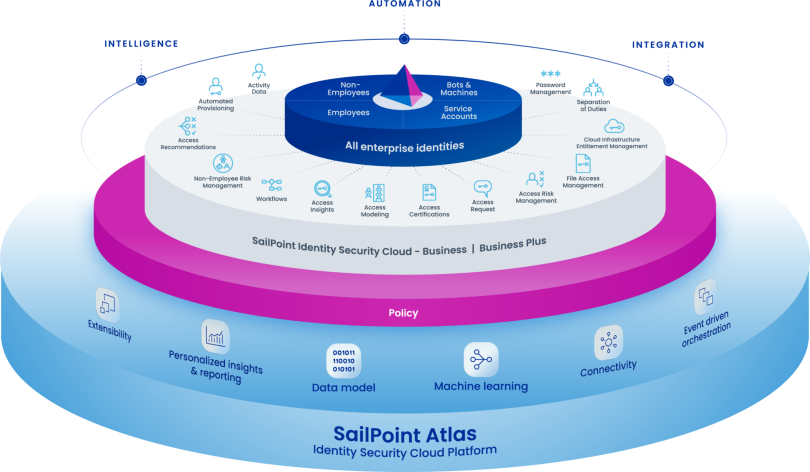“Do you care about the future of the world?”
This is what Andrew Moore would ask anyone who questioned why they should work in the identity security space. Because what’s more important than protecting the world’s most important enterprises from cyber crime?
Before stepping into his role as VP of product management at SailPoint, Moore worked for major brands, including Under Armour and Expedia, where he saw the importance and growth of cybersecurity firsthand. As consumers continue to reap the value of newer technology, he explained, there’s an increasing need to protect our digital lives in the process.
That’s where SailPoint Atlas comes in. According to Moore, the team at SailPoint has been building toward this platform for a few years, and just reached a powerful new milestone: SailPoint is able to talk about the newly branded unified platform and its common services are resonating with customers. SailPoint Atlas serves as the foundation for the company’s existing cloud capabilities, providing organizations with the tools they need to build, manage and scale identity security programs. These identity security programs ultimately make it possible for organizations to enable users, whether they’re employees, machines, partners, customers and so on, to do their job efficiently and securely.
“We built this platform for the largest enterprises in the world that need to secure billions of access points across their global organization,” he said.

If you think helping organizations secure billions of vectors of risks sounds complicated, you would be right. Boasting a combination of cutting-edge technology and powerful features, SailPoint Atlas is a complex, multifaceted platform that required ample teamwork and innovation to bring to life.
Engineering Manager Monica Agarwal played a pivotal role in overseeing the development of SailPoint Atlas. She and her teammates have watched the platform’s usage rate skyrocket over the past few months. An integral part of the platform is its workflows feature, which allows customers to run automated business processes. The execution of these workflows has skyrocketed, reaching 13 to 15 million executions per quarter.
“We’re at that point where we’re seeing huge adoption of our platform,” Agarwal said.
Given its growth and influence, SailPoint Atlas isn't simply an engineering marvel; it’s also a seller’s dream. For VP of Solution Engineering Michael Freel, the platform is unique in that it helps companies navigate their current identity security challenges effectively and scales to support as their needs evolve without having to re-architect or customize capabilities. So in a sense, it offers support while enabling success.
“We’re part of people’s critical security infrastructure,” he said. “But we also help them drive value by allowing people to have the right access at the right time to do their jobs.”
With its multilayered functionalities and enterprise-level impact, SailPoint Atlas reflects the many opportunities that come with working in the identity security space. As employees continue to refine SailPoint Atlas, they will hone their expertise while spearheading the continued development of a critical industry.
“If you just look at the way the world continues to evolve into a more digital space, it’s clear that identity security is a very important market going forward,” Moore said.
ABOUT SAILPOINT
Founded in 2005, SailPoint offers a suite of products designed to safeguard enterprise identities, improve IT efficiencies, reduce operational costs and mitigate cyber risks. The company serves organizations across a wide range of industries, including healthcare, education, financial services and manufacturing.
Unpacking the Complexity
Moore believes that, with the creation of SailPoint Atlas, the company has “hit an inflection point in scale” in its SaaS offerings.
So what does this inflection point look like? According to Moore, it’s a product grounded in AI and machine learning and composed of several key pillars, which support both the company’s internal engineering teams and its customers.
First and foremost, Moore said, the company’s product and engineering teams wanted to ensure the solution could be expanded to solve new identity security challenges without the need for re-engineering. They also made it so that customers can connect the product to any kind of application, whether custom-built or third-party, so they can securely gain greater visibility across their operations.
Moore added that, by centralizing its data model and machine learning common services in the Atlas platform, the company has reached an engineering milestone; one that reflects the new reality of business needs.
“If you want to keep up with the pace of security and what your business needs, you’ve got to have this kind of a platform.”
“If you want to keep up with the pace of security and what your business needs, you’ve got to have this kind of a platform.”
Apart from these features, the product’s workflow automation functionality serves its own purpose in unlocking greater autonomy for customers. Agarwal’s team developed customizable, no-code workflows that enable administrators to easily create custom use cases.
“For example, if one person leaves the company, a custom workflow can disable all their access to the company’s systems and applications,” she explained.
The workflows are enhanced by the capability to get user input. To help organizations tap into this valuable resource, Agarwal’s team created dynamic custom forms that allow users to submit data, which is then consumed as part of the workflow.
According to Freel, all of these capabilities within SailPoint Atlas enable its customers to stay ahead of the ever-changing identity security landscape. Rather than simply automate tasks, SailPoint Atlas also gives customers a unique perspective from which they can garner important insights, such as recommendations, roles and outliers.
“Enterprises know that they will never operate without great identity security, but they need help,” Freel said. “That’s one of the things SailPoint Atlas is doing for the customers: we’re providing that point of view and those insights that they’ve never had before.”

Evolution All Around
While SailPoint Atlas may be a new name for its existing platform, the platform signifies SailPoint’s long-standing focus on speeding up innovation in the identity security space.
And according to Freel, this ongoing growth opens up greater possibilities to evolve professionally.
“The career opportunities that we’ve been able to deliver to our employees have been fantastic,” he said.
These opportunities take various forms, including upward mobility and cross-functional promotions. Moore said he has seen various team members step into leadership roles and transition into different departments since joining the company.
But aside from formal growth, there are other ways for employees to sharpen their skills and build new ones. One prime example of this, Moore noted, is the company’s “innovation workshop,” which enables employees from across the organization to participate in a competition that’s similar to a hackathon — yet slightly different.
“What makes this different from a typical hackathon is that anyone in the company can submit their ideas and build a team around it,” he said.
Once the best ideas are chosen, the winning teams get paired with leaders from across the company who help them progress to the final round, where they present their projects to senior executives. If the idea is a standout, it may find its way into the company’s product suite. Moore noted that there was such great competition at this year’s workshop that not one, but two teams’ ideas have been implemented into the company’s 2024 product roadmap.
“SailPoint’s ‘Innovation Workshop’ encourages anyone in the company to submit ideas and build a team. The best ideas are chosen, and the winning teams get paired with leaders to help them progress to the final round.”
“It’s a great opportunity for people who aren’t in research and development to have that kind of an experience and get their ideas front and center,” he said.
Agarwal added that the engineering department frequently hosts “tech talks” and lunch and learns, during which experts from across the company will discuss tools that could possibly benefit the company’s existing tech stack. Team members can also take part in open design sessions, through which they can present their own design ideas and receive feedback from their peers.
“It’s an amazing opportunity to brainstorm technical designs and ensure that they fit the purpose of what we do,” Agarwal said.
UNTRADITIONAL BACKGROUNDS ENCOURAGED
When SailPoint searches for new talent, Freel said, they look for individuals with diverse skill sets. This means that many of the people who join the company don't have a traditional background in identity security and instead possess experience in various disciplines, including HR and data. “It has allowed a lot of people to grow by being able to share their knowledge, and it also helps keep us fresh and sharp, especially those of us who have been in the identity security space for a while,” Freel said. He encourages everyone interested in SailPoint to consider applying, as more unique skill sets will enable the company to serve its customers more effectively.
Solving Problems To Shape The Future
Professionals accomplish many different things within the span of a day. For Freel, the typical nine-to-five involves helping enterprises redefine their operations.
“Over the past 24 hours, I’ve talked with customers to help them launch products, enter new markets and geographies and pass security audits — all kinds of really interesting topics,” he said.
This level of support is essential for major organizations, Agarwal explained, because every enterprise is vulnerable, due to the industry-wide shift from on-premises software to the cloud.
What does this mean for engineers specifically? According to Agarwal, it means a lot — literally.
“As engineers, we’re looking to solve the biggest challenges, and that’s what you see when you have 2 million identities and more than 1,000 interconnected applications in an organization,” she said.
With so much complexity to navigate on a daily basis, engineers who work in identity security have the unique opportunity to overcome critical hurdles that affect the world’s largest organizations. Sounds daunting, right? Maybe, but that’s exactly why Agarwal wouldn’t want to work anywhere else.
“There are such big problems to solve,” she said. “It’s really amazing to be in this field today.”








